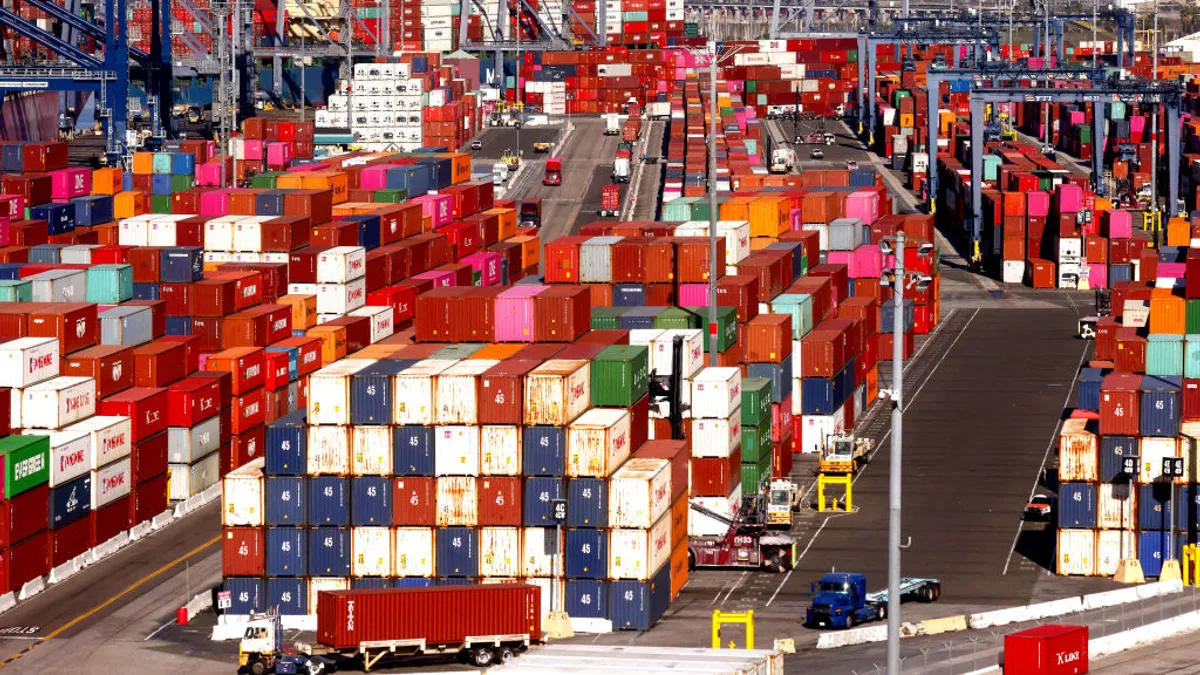Dive Brief:
- The Biden Administration has asked ports, shippers, carriers, 3PLs and other stakeholders for help developing an information exchange that can help improve cargo velocity, the White House announced Tuesday.
- The Freight Logistics Optimization Works initiative, led by the U.S. Department of Transportation, aims to produce a proof-of-concept freight data sharing initiative by the end of summer, according to a fact sheet.
- The pilot is limited to 15 companies and the San Pedro Bay and Georgia ports, but a web page is expected to go live within a month of the launch to gauge industry interest in participating in the program.
Dive Insight:
As supply chains are mostly run by private companies, governments face limits to their ability to improve cargo flow. But Biden’s Supply Chain Disruptions Task Force brings together stakeholders on three conference calls a week to discuss problems and identify solutions.
"I'm very pleased with industry’s willingness to partner, share data, and develop new information that will help the goods movement chain operate more efficiently," said U.S. Port Envoy John D. Porcari, who leads the calls, in a statement after a separate meeting of supply chain stakeholders in Long Beach last week.
"I encourage the private sector to continue moving toward consensus around data sharing needs," Porcari added.
The Freight Logistics Optimization Works initiative "will test the idea that cooperation on foundational freight digital infrastructure is in the interest of both public and private parties," the fact sheet said.
One critical area identified for improvement is the lack of data sharing among supply chain partners. While companies have generally improved their visibility into their own operations in recent years, many are reluctant to share data with others.
The national portal — a voluntary exchange available to all participants who share data — would be built on performance-based and technology-neutral standards for the exchange and use of the data.
The goals include ensuring early return dates are consistent across partners, measuring more accurate chassis availability, and understanding aggregate dwell time throughout the pilot, according to the fact sheet.
Pilot members include the ports of Los Angeles and Long Beach, the Georgia Ports Authority, carriers CMA CGM and MSC, and terminal operators Fenix Marine Terminal and Global Container Terminals. Albertsons, Gemini Shippers, Land O' Lakes, Target, True Value, CH Robinson, DCLI, FlexiVan, FedEx, Prologis and UPS are also participating.
The companies' executives met Tuesday with Brian Deese, director of the National Economic Council, and U.S. Transportation Secretary Pete Buttigieg to tout the new initiative and discuss their progress in easing supply chain congestion. The San Pedro Bay ports have seen a roughly 60% reduction in aging containers since October, according to a meeting readout.
The U.S. DOT initiative is far from the only data-visibility improvement underway, even among members of the pilot.
The Port of Los Angeles’ Port Optimizer now allows for the display of data from all 12 marine terminals and 70% of the imports at the San Pedro Bay ports complex, Executive Director Gene Seroka said in a briefing last month.
The Northwest Seaport Alliance, meanwhile, has joined the Port of Long Beach’s planned data-sharing efforts, to be known as the Supply Chain Information Highway, the Long Beach port announced earlier this month.
Mario Cordero, executive director of the Port of Long Beach, also issued a statement emphasizing the benefits of better collaboration after the meeting of the Supply Chain Optimization and Resilience Coalition, which includes shippers, ports, carriers and others.
"Our customers and their customers are ready for a new era of data visibility that maximizes efficiency and minimizes delay in goods movement," Cordero said.















